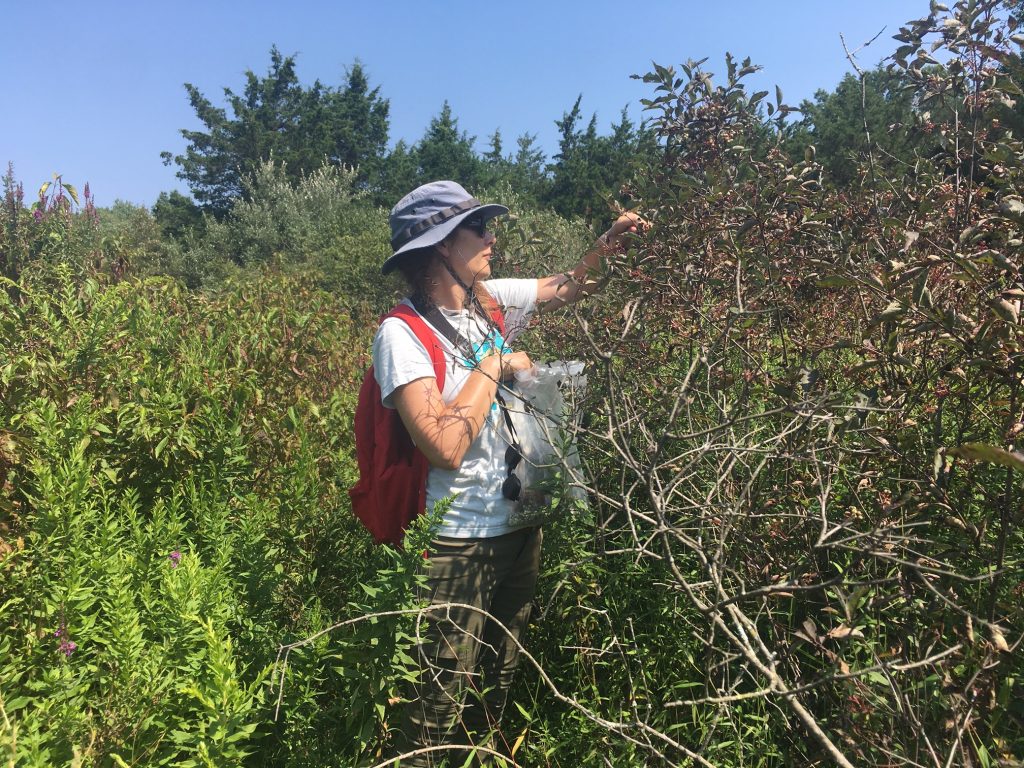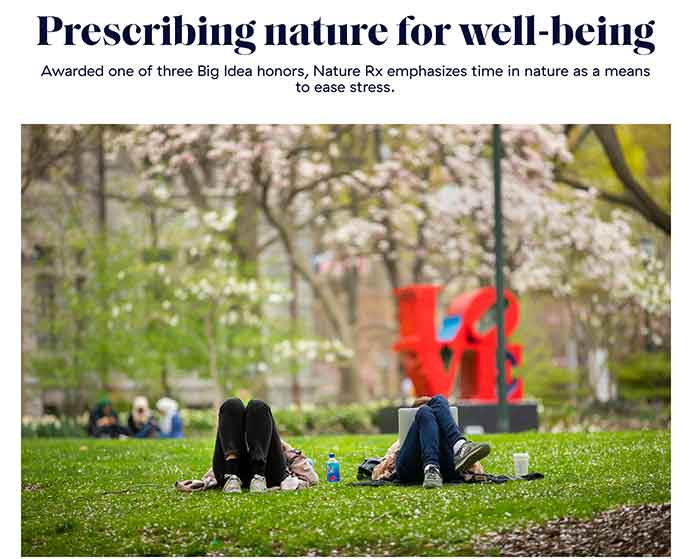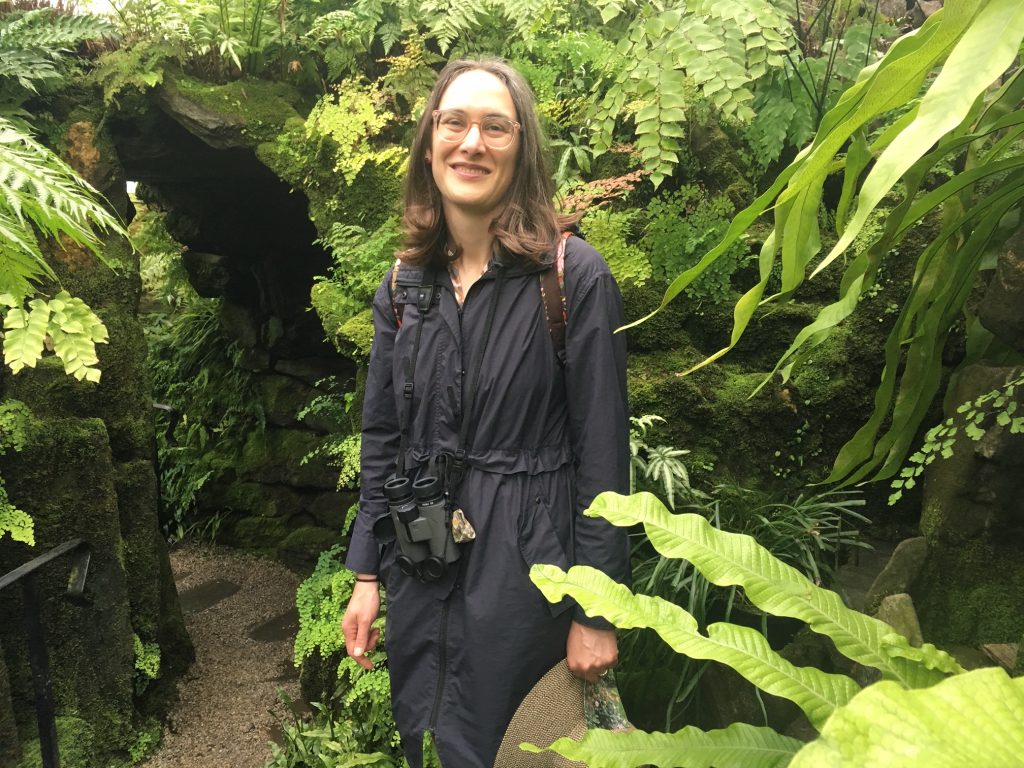Expanding Her Mind: Chloe Cerwinka ’90
This steward of the earth learned to respect and work with the environment as a kindergartener.
It is entirely possible that Chloe Cerwinka, Class of 1990, would not have studied Design of the Environment at the University of Pennsylvania had Miquon not supported her curiosity to expand her mind during her formative years.
The degree that encompassed many of her interests, including architecture, landscape architecture, urban planning and conceptual art had its roots in her days in the woods around the Miquon, where learning about math, science, art and more was done during each day by climbing trees, catching salamanders in the creek, exploring the woods, growing food in raised garden beds, building catapults, and playing Capture the Flag.
Lifelong Love of Learning and Nature
“Miquon instilled in me a lifelong love of learning and of nature,” says Cerwinka. “The open-ended activities and experiencing nature to its full extent on a daily basis provided me with a solid educational foundation and the confidence to think for myself, solve problems and determine what I believe in. I have so many fond memories, and I am grateful for the time I spent there and all the people and experiences that shaped who I am today.”
Born in Boston, where the family lived while Chloe’s father, Allan Molotsky, finished law school at Northeastern University, she grew up in Philadelphia and was recently married to Max Blaustein, who works for The City of Philadelphia as an environmental scientist running Greenland Nursery.
Cerwinka’s mother, Hedy Cerwinka, was part of a group of new moms in Mt. Airy when friends recommended Miquon to the family. When Chloe was getting ready to enroll in Kindergarten, her parents didn’t like the idea of sending their carefree daughter to a school where she would have to sit at a desk all day, and Miquon’s Progressive education model appealed to them. Hedy even worked as an assistant teacher there while Chloe was in Kindergarten and first grade.
“My parents were so right,” says Cerwinka. “Miquon encouraged me to explore who I was as an individual, to pursue my own path and figure out what I loved.”
That encouragement came in many and varied forms.
“I loved where design, math, and science overlapped,” remembers Cerwinka. “I became obsessed with figuring out how to build a complex 3-D geometric star and how to fit all the different pieces together to create this beautiful object out of nothing.
“And I got so interested in topiary that I convinced my mom to visit a topiary maze on one of our vacations and even constructed a cat topiary at home in our front yard. Learning how to start seeds and grow my own food was incredibly fulfilling and gave me the tools I needed to experience joy and learn how to provide for myself.”
 Still today, Cerwinka says one of her favorite things is just experiencing nature, whether it’s hiking through the woods, birding, gardening, camping or just spending time in her backyard.
Still today, Cerwinka says one of her favorite things is just experiencing nature, whether it’s hiking through the woods, birding, gardening, camping or just spending time in her backyard.After her sixth-grade graduation, Cerwinka attended Masterman School on Spring Garden Street in Philadelphia for three years. From there, she went to Plymouth Whitemarsh High School in Plymouth Meeting, where she founded the student Democrat Club after learning that none existed, even though a Republican Student Club did.
Intellectually Prepared for Life After Miquon
“Intellectually, I was prepared for my continued schooling [after Miquon], but there was a cultural shift,” says Cerwinka. “Miquon was open and less rigid — calling teachers by their first names and sitting at communal tables, for example. I had to get used to all the rules as well as sitting in individual desk chairs!
“I’m so grateful that Miquon shaped my sense of community and worldview, which helped me acclimate to new situations and experiences.”
After earning her B.A. in Design of the Environment at Penn, Cerwinka worked as an architectural designer for years, first with Coburn Architecture in Brooklyn, NY, and later with Noury-Ello Architects in Boston. In these roles, she designed and managed residential and commercial renovation and addition projects from design development through construction, creating detailed drawing sets in the process, and worked with clients, contractors and consultants.
She spent some time “dabbling in” photography, event planning, archiving and sustainable urban agriculture before landing her current job as a landscape planner at the University of Pennsylvania in 2012.
Of the 300 acres that compose the university’s West Philadelphia campus, 100 acres is open space. In her role, Cerwinka preserves and improves that campus landscape through ecological design, research, and planning—as a steward of the land. She has spearheaded initiatives including planting an orchard in Penn Park with the Philadelphia Orchard Project; creating Penn Plant Explorer, an online resource linked to the 6,500 trees on campus; helping the campus become recognized as an official Arboretum; implementing an Ecological Landscape Stewardship Plan; and creating bird-friendly buildings and landscapes.
In the fall of 2019, as a partnership with Wellness at Penn, she will work on developing a “Nature Rx Program,” writing prescriptions to direct people outside. Being in nature has been proven to mitigate mental health issues, and the program was recently covered in an issue of Penn Today at the university.
 Click to read more about Nature RX on Penn Today’s website.
Click to read more about Nature RX on Penn Today’s website.“I love this job,” says Cerwinka. “It encompasses so many of my interests, and beyond the standard tasks, there is room for interpretation. I get to work with all kinds of people on a regular basis, including grounds crews, professors, people from all over the university, external consultants (wildlife ecologists, architects, landscape architects, engineers, etc.). Many of the things I do aren’t required for the role, but help Penn accomplish certain broad goals around wellness, environmental stewardship and sustainability.”
Cerwinka currently is pursuing a Master’s Degree in Environmental Studies at Penn and uses the campus as a living lab for her capstone project, “Birds as Ecological Indicators on Penn’s Campus.” She will collect two years of data about the birds on campus to help improve the ecological habitat that will encourage even more species of birds to make their homes on Penn’s campus.
“Birds are commonly used as ecological indicators for landscapes, since they can tell you a lot about the health of an ecosystem,” she explains. “If birds are in a landscape, it likely means they are able to find food, such as berries or insects, and water to drink as well as find shelter in plantings and potentially areas to nest. Therefore, if birds are around and healthy, it’s likely that the environment is functioning and healthy for people and other wildlife.
“Urban areas are often thought of as less important than rural areas, but I want to demonstrate that cities, and in particular Penn’s campus, have important roles to play in ecology. Nature is not separate from the city. Since beginning to collect data in April 2018, I have found close to 80 species of birds throughout different types of campus landscapes and I hope to document even more by the end of this year. As a landscape planner, I can play a role in improving the biodiversity of campus for long-term resilience by creating more ecological environments.”
Learn more about Cerwinka’s project.
